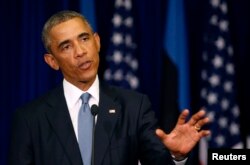As the Obama administration weighed in heavily on Wednesday with stern warnings to Islamic State militants, some U.S. lawmakers are demanding extensive air attacks while others are taking a more measured response.
The rhetoric could help spur U.S. public support for a military response, analysts say.
President Barack Obama told reporters in Estonia that the U.S. intends to build a coalition to “degrade and destroy” Islamic State militants. Obama spoke after U.S. officials confirmed the veracity of a video that showed the beheading of an American journalist held captive by Islamic State militants.
Speaking in Portsmouth, New Hampshire, Vice President Joe Biden said of IS: “We will follow them to the gates of hell until they are brought to justice because hell is where they will reside.”
Senator Ted Cruz of Texas, a likely contender for the Republican Party’s presidential nomination in 2016, spoke too in tough language to a conservative conference in Dallas a few days ago.
‘“ISIS says they want to go back and reject modernity,” he said. “Well, I think we should help them. We ought to bomb them back to the Stone Age!”
Other lawmakers are urging a more cautious approach and appear willing to give the Obama administration more time to formulate a comprehensive strategy for dealing with ISIS.
"It takes time to build a coalition. We can’t simply bomb first and ask questions later," said Congressman Adam Smith, a Democrat from Washington State who appeared on CBS’ Face the Nation. "We have to have the right targets and the right support in order to be effective in stopping ISIS.”
Sotloff’s death and the previous beheading of American journalist James Foley have angered many Americans and that in turn could spur public opinion in support of military strikes against the Islamic State group, also known as ISIS.
Sotloff was a native of Florida and state Governor Rick Scott took the unusual step of interrupting a campaign event to announce the reporter's death and condemn those responsible.
“The people who did this are evil. They are not merely wrong. They are not adversaries," he said. "They are evil.”
But so far there has been little domestic public polling on the threat posed by ISIS and what the U.S. should do about it.
A recent Reuters/Ipsos poll taken before the Sotloff murder found Americans split on the question of whether to intervene in Iraq. Twenty-nine percent said the U.S. should not intervene. Twenty-one percent said the U.S. should launch airstrikes to support the Iraqi government, while 22 percent said they didn’t know what the response should be.
Karlyn Bowman, who monitors U.S. public opinion at the American Enterprise Institute in Washington, said many Americans are likely to see Islamic State as a threat worthy of some form of military response.
“Over the course of the summer clearly we saw reluctance to get very involved in the situation in the Middle East,” she said. “We’ve certainly seen a lot of polls. But this represents such a clear danger and with members of Congress and the president talking about how clear the danger is I think public opinion will follow.”
Bowman also said the gruesome nature of the beheading videos of the two American journalists leads to outrage among the public and a greater determination to support actions that target the terrorists.
“The nature of the images, just the discussions and being able to hear these people’s voices, it has a very, very powerful effect on public opinion,” she said.
But public support is not likely to extend to the use of U.S. ground troops, said Ohio State expert John Mueller. Mueller has written extensively about the reluctance of the American public to commit ground forces in the wake of the conflicts in Afghanistan and Iraq.
“Efforts that are pinprick-like and supportive and do not cost American lives might find a certain amount of tolerance but not anything bigger than that,” he said. “The American public seems to be overwhelmingly fed up with getting into these foreign wars and there is intense wariness about getting involved with ground troops.”
The public will have plenty of opportunities to express itself in the weeks ahead.
Congress returns to Washington next week and the U.S. response to the threat posed by Islamic State is likely to be a central focus of debate. Some lawmakers are already urging the president to seek congressional approval before launching a wider military campaign against the extremist group.






